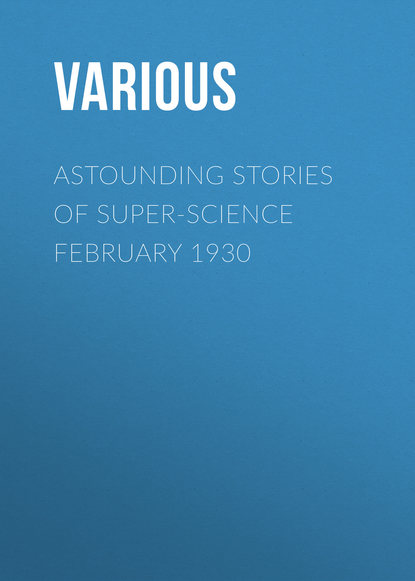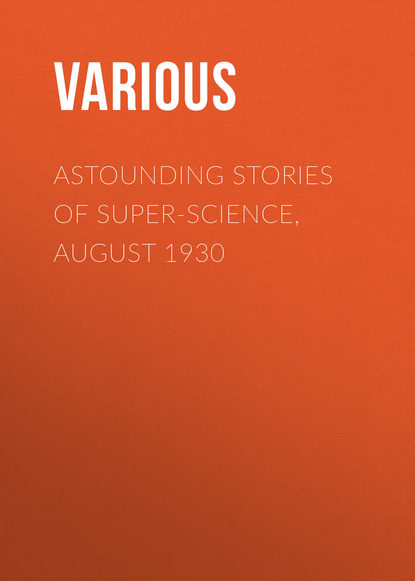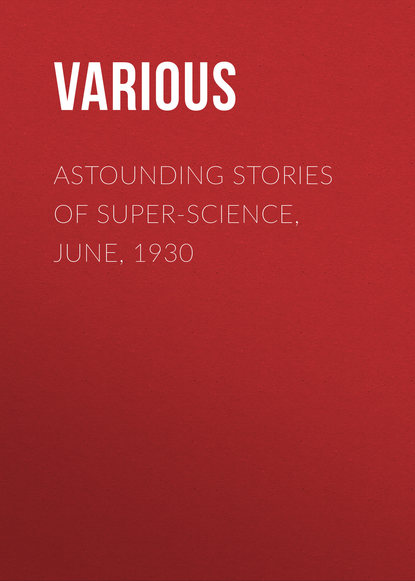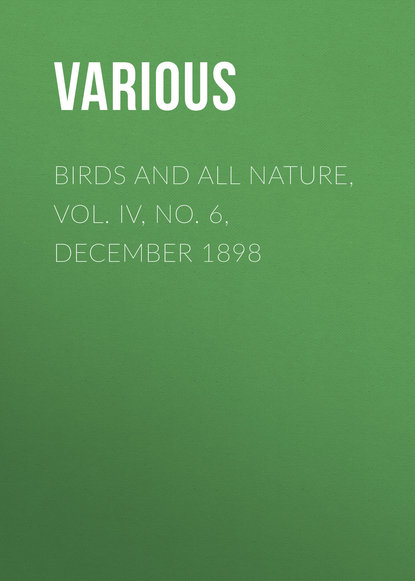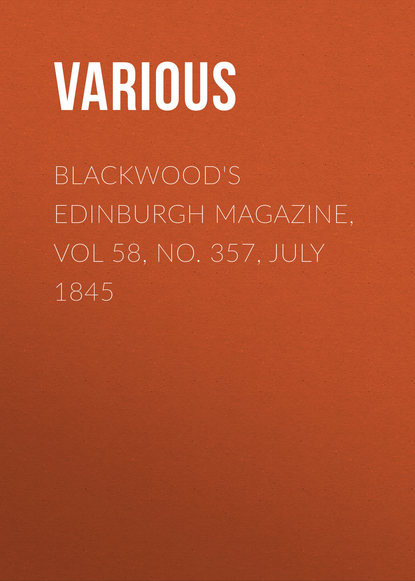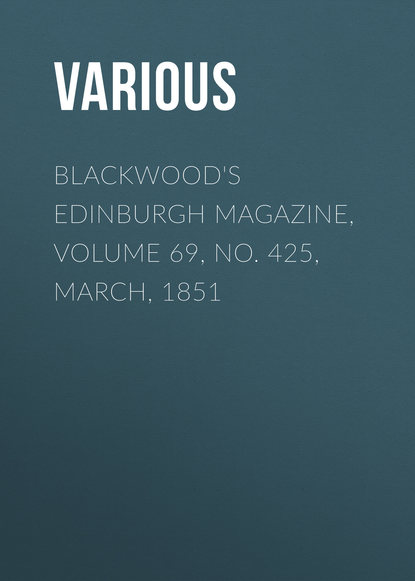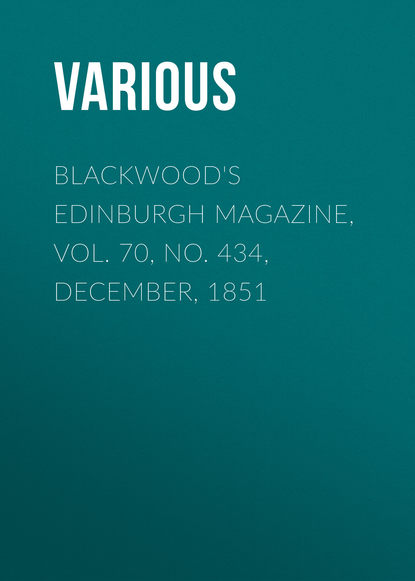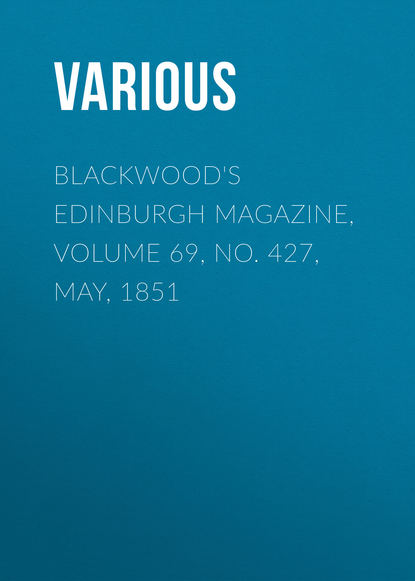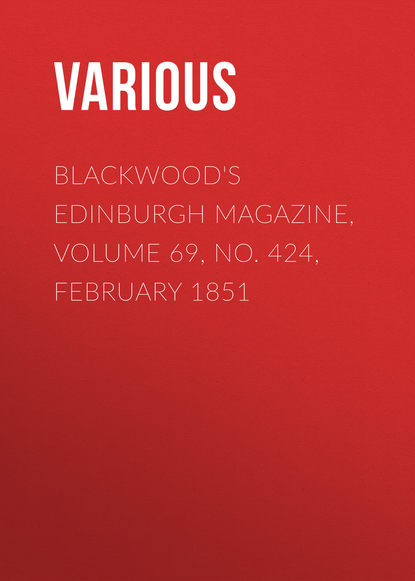
Полная версия
Blackwood's Edinburgh Magazine, Volume 69, No. 424, February 1851

Various
Blackwood's Edinburgh Magazine, Volume 69, No. 424, February 1851
LATIMER AND RIDLEY BURNED AT THE STAKE IN OXFORD, A.D. 1555
[The fires of Smithfield and the massacre of Bartholomew are truly events of little consequence in history, if they fail to convince us of the aggressive and unscrupulous policy of the Roman Catholic Church. The claim of the Pope, which never has undergone or can undergo any modification whatever, is nothing less than one of universal supremacy. That claim is asserted now as broadly and boldly as it was three hundred years ago; when, at the accession of Mary, Cardinal Pole was sent over as legate to England, for the reduction of that realm to the obedience of the See of Rome, and for the extirpation of heresy.
It matters not what may have been the private character of the Cardinal. He has been represented as a man of mild nature, humane disposition, and averse to the infamous cruelties which were then perpetrated, the odium of which has been commonly thrown upon Bishops Gardiner and Bonner. This much at least is plain, that, whatever may have been his opinion as to the methods which were employed for the suppression of Protestantism, he did not deem it expedient to exercise his great power in mitigating the fury or tempering the cruelty of the persecution. He was a passive witness of the enormities, and allowed the mandates of the Church to supersede the dictates of humanity and the merciful teaching of the Saviour.
The records of the reign of Mary ought, especially at the present time, to be studied by those who, in their zeal for toleration, forget that they have to contend with most bitter and uncompromising enemies. Not only the sufferings and fortitude of the martyrs, (among whom were numbered five bishops, and twenty-one clergymen of the Reformed faith of England,) but the charges on which they were condemned, and the noble testimony which they bore, will be found detailed in John Foxe's Acts and Monuments. Next to that of Archbishop Cranmer, the names of Latimer and Ridley can never be forgotten in this land, so long as the voice of Protestantism is heard against Papal superstition and supremacy. Political and ecclesiastical dominion are things inseparable from each other in the eye of Rome; and wherever she has succeeded in planting her foot, she has attempted to enforce spiritual submission, and to extinguish liberty of conscience, by the power of the secular arm. The following extract, from the work already referred to, narrates the close of the terrible tragedy which consigned two English prelates to the flames at Oxford: —
"Then they brought a faggot, kindled with fire, and laid the same down at Dr Ridley's feet. To whom master Latimer spake in this manner: 'Be of good comfort, master Ridley, and play the man. We shall this day light such a candle, by God's grace, in England, as I trust shall never be put out.'
"And so the fire being given unto them, when Dr Ridley saw the fire flaming up towards him, he cried with a wonderful loud voice, 'In manus tuas, Domine, commendo spiritum meum: Domine, recipe spiritum meum.' And after, repeated this latter part often in English, 'Lord, Lord, receive my spirit;" master Latimer crying as vehemently on the other side, 'O Father of heaven, receive my soul!' who received the flame as it were embracing of it. After that he had stroked his face with his hands, and as it were bathed them a little in the fire, he soon died (as it appeareth) with very little pain or none. And thus much concerning the end of this old and blessed servant of God, master Latimer, for whose laborious travails, fruitful life, and constant death, the whole realm hath cause to give great thanks to Almighty God.
"But master Ridley, by reason of the evil making of the fire unto him, because the wooden faggots were laid about the gorse, and over-high built, the fire burned first beneath, being kept down by the wood; which when he felt, he desired them for Christ's sake to let the fire come unto him. Which when his brother-in-law heard, but not well understood, intending to rid him out of his pain (for the which cause he gave attendance,) as one in such sorrow not well advised what he did, heaped faggots upon him, so that he clean covered him, which made the fire more vehement beneath, that it burned clean all his nether parts, before it once touched the upper; and that made him leap up and down under the faggots, and often desire them to let the fire come unto him, saying, 'I cannot burn.' Which indeed appeared well; for, after his legs were consumed by reason of his struggling through the pain (whereof he had no release, but only his contentation in God,) he showed that side toward us clean, shirt and all untouched with flame. Yet in all this torment he forgot not to call unto God still, having in his mouth, 'Lord, have mercy upon me!' intermingling his cry, 'Let the fire come unto me: I cannot burn.' In which pangs he laboured till one of the standers-by with his bill pulled off the faggots above, and where he saw the fire flame up, he wrested himself unto that side. And when the flame touched the gunpowder, he was seen to stir no more, but burned on the other side, falling down at master Latimer's feet; which, some said, happened by reason that the chain loosed; others said, that he fell over the chain by reason of the poise of his body, and the weakness of the nether limbs.
"Some said, that before he was like to fall from the stake, he desired them to hold him to it with their bills. However it was, surely it moved hundreds to tears, in beholding the horrible sight; for I think there was none that had not clean exiled all humanity and mercy, which would not have lamented to behold the fury of the fire so to rage upon their bodies."]
I'Tis good to sing of champions oldThe honour and renown;To tell how truth and loyaltyHave saved an earthly crown.But shame to us, if on the dayWhen higher themes are given —When man's device and man's decreeUsurp the word of Heaven —We dare forget the nobler namesOf those who vanquished death,To keep unstained, from sire to son,Our freedom and our faith!IIWe bend the knee and bow the headUpon the Christmas morn,In token that, for sinful men,The Saviour, Christ, was born.Nor less, unto the faithful heart,That time must hallowed be,On which our Lord and Master diedIn anguish on the tree;And Easter brings its holy hymn,Its triumph o'er the grave,When He, the dead, arose in might,Omnipotent to save.IIIWe worship as our fathers did,In this our English home,Not asking grace from mortal manNor craving leave from Rome.Once more the warning note is heard,The hour of strife is near —What seeks he, with his mitred pomp,That rank Italian, here?What sought they in the former days,When last that mission came?The will, the craft, the creed of RomeRemain for aye the same!IVWoe, woe to those who dared to dreamThat England might be free;That Papal power and Papal ruleWere banished o'er the sea;That he who sate in Peter's chair,Had lost the will to harm,Was powerless as a withered croneWho works by spell and charm!Woe, woe to those who dared denyThe Roman Pontiff's sway!His red right arm is bared in wrath,To smite, and burn, and slay!VLight up, light up the ready fires!Sound trumpet, fife, and drum;Give welcome meet to him who bringsThe sovereign hests of Rome.No humble barefoot messenger —No sandalled monk is he;A stately priest – a Cardinal —Proclaims the Pope's decree.And see! upon her royal kneesThe Queen of England falls,In homage to a mightier Prince,Within her fathers' halls!VI'Tis done. Fair England! bow thy head,And mourn thy grievous sin!What though the Universal ChurchWill gladly let thee in?The stain is still upon thy brow,The guilt is on thy hand;For thou hast dared to worship God,Against the Pope's command.And thou hast scoffed at saint and shrine,Denied the Queen of heaven,And opened up with impious handsThe Holy Book unshriven.VIIFor this, and for thy stubborn willIn daring to be free,A fearful penance must be doneEre guilt shall pass from thee.The prophets of the new-born faith,The leaders of the blind —Arise, and take them in the midst —Leave not a man behind!In London's streets and Oxford's courtsA solemn fast proclaim,And let the sins of England's ChurchBe purged away by flame!VIIIIn order long, the monkish throngWind through the Oxford street,With up-drawn cowls, and folded hands,And slow and noiseless feet.Before their train the CrucifixIs borne in state on high,And banners with the Agnus wave,And crosiers glitter by:With spangled image, star-becrowned,And gilded pyx they come,To lay once more on English necksThe hateful yoke of Rome.IXThe mail-clad vassels of the ChurchWith men-at-arms are there,And England's banner overheadFloats proudly in the air.And England's bishops walk beneath —Ah me! that sight of woe!An old, old man, with tottering limbsAnd hair as white as snow.Another, yet in manhood's prime,The blameless and the brave —And must they pass, O cruel Rome,To yonder hideous grave?X"Ay – for the Church reclaims her own;To her all power is given —The faggot and the sword on earth —The keys of hell and heaven.To sweep the heretics away,'Tis thus the Church commands —What means that wailing in the crowd?Why wring they so their hands?Why do the idle women shriek —The men, why frown they so?Lift up the Host, and let them kneel,As onwards still we go."XIThe Host was raised – they knelt not yet —Nor English knee was bowed,Till Latimer and Ridley came,Each in his penance shroud.Then bent the throng on either side,Then knelt both sire and dame,And thousand voices, choked with sobs,Invoked the martyr's name.No chaunted hymn could drown the cry,No tramp, nor clash of steel —O England! in that piteous hour,Was this thy sole appeal?XIIWhat more? That cry arose on high;'Twas heard, where all is calm,By Him who, for the martyr's pang,Vouchsafes the martyr's palm;By Him who needs no human armTo work his righteous will: —"The Lord is in his holy place,Let all the earth be still."They said it – they who gave the doom,In that most awful name —And if they spoke in blasphemy,So shall they die in shame!XIIITo death – to death! The stake is near,The faggots piled around;The men-at-arms have made their ring,The spearmen take their ground;The torches, reeking in the sun,Send up their heavy fume;And by the pile the torturerIs waiting for the doom.With earnest eye and steadfast step,Approach the martyr twain —"Our cross!" they said – then kissed the stake,And bowed them to the chain.XIVShort be the pang! – Not yet, not yet!The Tempter lingers near —Rome parts not with her victims so;A Priest is at their ear."Life – life, and pardon! say the word,Why still so stubborn be?Do homage to our Lord the Pope —One word, and you are free!O brothers! yield ye even now —Speak but a single name —Salvation lies not but with Rome;Why die in raging flame?"XVThen out spoke aged Latimer: —"I tarry by the stake,Not trusting to my own weak heart,But for the Saviour's sake.Why speak of life or death to me,Whose days are but a span?Our crown is yonder – Ridley – see!Be strong, and play the man.God helping, such a torch this dayWe'll light on English land,That Rome and all her CardinalsShall never quench the brand!"XVIThey died. O ask not how they died!May never witness tell,That once again on English groundWas wrought that deed of hell!The Consul, mad for Christian blood,Even in his deadliest rage,Was human when he opened upThe famished lion's cage —More human far than they of Rome,Who claimed the Christian name,When those, the ministers of Christ,Were writhing in the flame!XVIIHarlot of Rome! and dost thou comeWith bland demeanour now?The bridal-smile upon thy lips,The flush upon thy brow —The cup of sorcery in thy hand,Still in the same array,As when our fathers in their wrathDashed it and thee away?No! by the ashes of the saints,Who died beneath thy hand,Thou shalt not dare to claim as thineOne foot of English land!XVIIIThe echo of thy tread shall makeThe light still higher burn —A blaze shall rise from Cranmer's graveAnd martyred Ridley's urn!A blaze which they who own thy powerShall stand aghast to see,A blaze that in your infamyShall show both them and thee!Yes! send thy Cardinals again —Once more array thy powers —Their watchword is, The Pope of Rome —The Word of God, be ours!W. I.MY NOVEL; OR, VARIETIES IN ENGLISH LIFE. – PART VI
CHAPTER XIII
Whatever may be the ultimate success of Miss Jemima Hazeldean's designs upon Dr Riccabocca, the Machiavellian sagacity with which the Italian had counted upon securing the services of Lenny Fairfield was speedily and triumphantly established by the result. No voice of the Parson's, charmed he ever so wisely, could persuade the peasant-boy to go and ask pardon of the young gentleman, to whom, because he had done as he was bid, he owed an agonising defeat and a shameful incarceration. And, to Mrs Dale's vexation, the widow took the boy's part. She was deeply offended at the unjust disgrace Lenny had undergone in being put in the stocks; she shared his pride, and openly approved his spirit. Nor was it without great difficulty that Lenny could be induced to resume his lessons at school – nay, even to set foot beyond the precincts of his mother's holding. The point of the school at last he yielded, though sullenly; and the Parson thought it better to temporise as to the more unpalatable demand. Unluckily Lenny's apprehensions of the mockery that awaited him in the merciless world of his village were realised. Though Stirn at first kept his own counsel, the Tinker blabbed the whole affair. And after the search instituted for Lenny on the fatal night, all attempt to hush up what had passed would have been impossible. So then Stirn told his story, as the Tinker had told his own; both tales were very unfavourable to Leonard Fairfield. The pattern boy had broken the Sabbath, fought with his betters, and been well mauled into the bargain; the village lad had sided with Stirn and the authorities in spying out the misdemeanours of his equals: therefore Leonard Fairfield, in both capacities of degraded pattern boy and baffled spy, could expect no mercy; – he was ridiculed in the one, and hated in the other.
It is true that, in the presence of the schoolmaster, and under the eye of Mr Dale, no one openly gave vent to malignant feelings; but the moment those checks were removed, popular persecution began.
Some pointed and mowed at him; some cursed him for a sneak, and all shunned his society; voices were heard in the hedgerows, as he passed through the village at dusk, "Who was put in the stocks? – baa!" "Who got a bloody nob for playing spy to Nick Stirn? – baa!" To resist this species of aggression would have been a vain attempt for a wiser head and a colder temper than our poor pattern boy's. He took his resolution at once, and his mother approved it; and the second or third day after Dr Riccabocca's return to the Casino, Lenny Fairfield presented himself on the terrace with a little bundle in his hand. "Please, sir," said he to the Doctor, who was sitting cross-legged on the balustrade, with his red silk umbrella over his head; "Please, sir, if you'll be good enough to take me now, and give me any hole to sleep in, I'll work for your honour night and day; and as for the wages, mother says 'just suit yourself, sir.'"
"My child," said the Doctor, taking Lenny by the hand, and looking at him with the sagacious eye of a wizard, "I knew you would come! and Giacomo is already prepared for you! As to wages, we'll talk of them by-and-by."
Lenny being thus settled, his mother looked for some evenings on the vacant chair, where he had so long sate in the place of her beloved Mark; and the chair seemed so comfortless and desolate, thus left all to itself, that she could bear it no longer.
Indeed the village had grown as distasteful to her as to Lenny – perhaps more so; and one morning she hailed the Steward as he was trotting his hog-maned cob beside the door, and bade him tell the Squire that "she would take it very kind if he would let her off the six months' notice for the land and premises she held – there were plenty to step into the place at a much better rent."
"You're a fool," said the good-natured Steward; "and I'm very glad you did not speak to that fellow Stirn instead of to me. You've been doing extremely well here, and have the place, I may say, for nothing."
"Nothin' as to rent, sir, but a great deal as to feeling," said the widow. "And now Lenny has gone to work with the foreign gentleman, I should like to go and live near him."
"Ah yes – I heard Lenny had taken himself off to the Casino – more fool he; but, bless your heart, 'tis no distance – two miles or so. Can't he come home every night after work?"
"No, sir," exclaimed the widow almost fiercely; "he shan't come home here, to be called bad names and jeered at! – he whom my dead goodman was so fond and proud of. No, sir; we poor folks have our feelings, as I said to Mrs Dale, and as I will say to the Squire hisself. Not that I don't thank him for all favours – he be a good gentleman if let alone; but he says he won't come near us till Lenny goes and axes pardin. Pardin for what, I should like to know? Poor lamb! I wish you could ha' seen his nose, sir – as big as your two fists. Ax pardin! If the Squire had had such a nose as that, I don't think it's pardin he'd been ha' axing. But I let's the passion get the better of me – I humbly beg you'll excuse it, sir. I'm no scollard, as poor Mark was, and Lenny would have been, if the Lord had not visited us otherways. Therefore just get the Squire to let me go as soon as may be; and as for the bit o' hay and what's on the grounds and orchard, the new comer will no doubt settle that."
The Steward, finding no eloquence of his could induce the widow to relinquish her resolution, took her message to the Squire. Mr Hazeldean, who was indeed really offended at the boy's obstinate refusal to make the amende honorable to Randal Leslie at first only bestowed a hearty curse or two on the pride and ingratitude both of mother and son. It may be supposed, however, that his second thoughts were more gentle, since that evening, though he did not go himself to the widow, he sent his "Harry." Now, though Harry was sometimes austere and brusque enough on her own account, and in such business as might especially be transacted between herself and the cottagers, yet she never appeared as the delegate of her lord except in the capacity of a herald of peace and mediating angel. It was with good heart, too, that she undertook this mission, since, as we have seen, both mother and son were great favourites of hers. She entered the cottage with the friendliest beam in her bright blue eye, and it was with the softest tone of her frank cordial voice that she accosted the widow. But she was no more successful than the Steward had been. The truth is, that I don't believe the haughtiest duke in the three kingdoms is really so proud as your plain English rural peasant, nor half so hard to propitiate and deal with when his sense of dignity is ruffled. Nor are there many of my own literary brethren (thin-skinned creatures though we are) so sensitively alive to the Public Opinion, wisely despised by Dr Riccabocca, as that same peasant. He can endure a good deal of contumely sometimes, it is true, from his superiors, (though, thank Heaven! that he rarely meets, with unjustly;) but to be looked down upon, and mocked, and pointed at by his own equals – his own little world – cuts him to the soul. And if you can succeed in breaking this pride, and destroying this sensitiveness, then he is a lost being. He can never recover his self-esteem, and you have chucked him half way – a stolid, inert, sullen victim – to the perdition of the prison or the convict-ship.
Of this stuff was the nature both of the widow and her son. Had the honey of Plato flowed from the tongue of Mrs Hazeldean, it could not have turned into sweetness the bitter spirit upon which it descended. But Mrs Hazeldean, though an excellent woman, was rather a bluff plain-spoken one – and, after all, she had some little feeling for the son of a gentleman, and a decayed fallen gentleman, who, even by Lenny's account, had been assailed without any intelligible provocation; nor could she, with her strong common sense, attach all the importance which Mrs Fairfield did to the unmannerly impertinence of a few young cubs, which, she said truly, "would soon die away if no notice was taken of it." The widow's mind was made up, and Mrs Hazeldean departed – with much chagrin and some displeasure.
Mrs Fairfield, however, tacitly understood that the request she had made was granted, and early one morning her door was found locked – the key left at a neighbour's to be given to the Steward; and, on farther inquiry, it was ascertained that her furniture and effects had been removed by the errand-cart in the dead of the night. Lenny had succeeded in finding a cottage, on the road-side, not far from the Casino; and there, with a joyous face, he waited to welcome his mother to breakfast, and show how he had spent the night in arranging her furniture.
"Parson!" cried the Squire, when all this news came upon him, as he was walking arm in arm with Mr Dale to inspect some proposed improvement in the Alms-house, "this is all your fault. Why did not you go and talk to that brute of a boy, and that dolt of a woman? You've got 'soft sawder enough,' as Frank calls it in his new-fashioned slang."
"As if I had not talked myself hoarse to both!" said the Parson in a tone of reproachful surprise at the accusation. "But it was in vain! O Squire, if you had taken my advice about the Stocks —quieta non movere!"
"Bother!" said the Squire. "I suppose I am to be held up as a tyrant, a Nero, a Richard the Third, or a Grand Inquisitor, merely for having things smart and tidy! Stocks indeed! – your friend Rickeybockey said he was never more comfortable in his life – quite enjoyed sitting there. And what did not hurt Rickeybockey's dignity (a very gentlemanlike man he is, when he pleases) ought to be no such great matter to Master Leonard Fairfield. But 'tis no use talking! What's to be done now? The woman must not starve; and I'm sure she can't live out of Rickeybockey's wages to Lenny – (by the way, I hope he don't board him upon his and Jackeymo's leavings: I hear they dine upon newts and sticklebacks – faugh!) I'll tell you what, Parson, now I think of it – at the back of the cottage which she has taken there are some fields of capital land just vacant. Rickeybockey wants to have 'em, and sounded me as to the rent when he was at the Hall. I only half promised him the refusal. And he must give up four or five acres of the best land round the cottage to the widow – just enough for her to manage – and she can keep a dairy. If she want capital, I'll lend her some in your name – only don't tell Stirn; and as for the rent – we'll talk of that when we see how she gets on, thankless obstinate jade that she is! You see," added the Squire, as if he felt there was some apology due for this generosity to an object whom he professed to consider so ungrateful, "her husband was a faithful servant, and so – I wish you would not stand there staring me out of countenance, but go down to the woman at once, or Stirn will have let the land to Rickeybockey, as sure as a gun. And hark-ye, Dale, perhaps you can contrive, if the woman is so cursedly stiff-backed, not to say the land is mine, or that it is any favour I want to do her – or, in short, manage it as you can for the best." Still even this charitable message failed. The widow knew that the land was the Squire's, and worth a good £3 an acre. 'She thanked him humbly for that and all favours; but she could not afford to buy cows, and she did not wish to be beholden to any one for her living. And Lenny was well off at Mr Rickeybockey's, and coming on wonderfully in the garden way – and she did not doubt she could get some washing; at all events, her haystack would bring in a good bit of money, and she should do nicely, thank their honours.'
Nothing farther could be done in the direct way, but the remark about the washing suggested some mode of indirectly benefiting the widow. And a little time afterwards, the sole laundress in that immediate neighbourhood happening to die, a hint from the Squire obtained from the landlady of the inn opposite the Casino such custom as she had to bestow, which at times was not inconsiderable. And what with Lenny's wages, (whatever that mysterious item might be,) the mother and son contrived to live without exhibiting any of those physical signs of fast and abstinence which Riccabocca and his valet gratuitously afforded to the student in animal anatomy.



